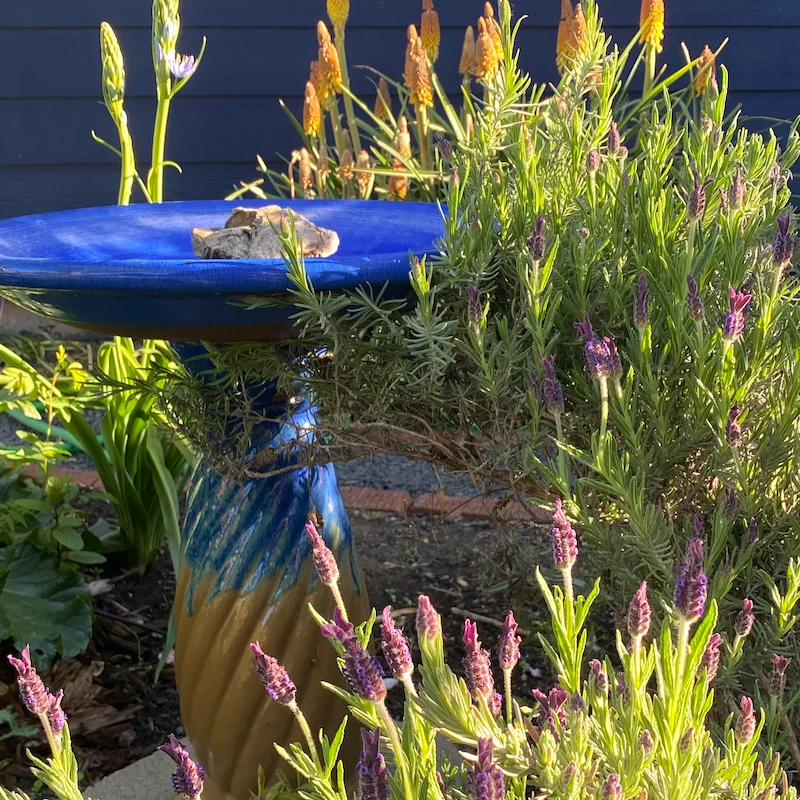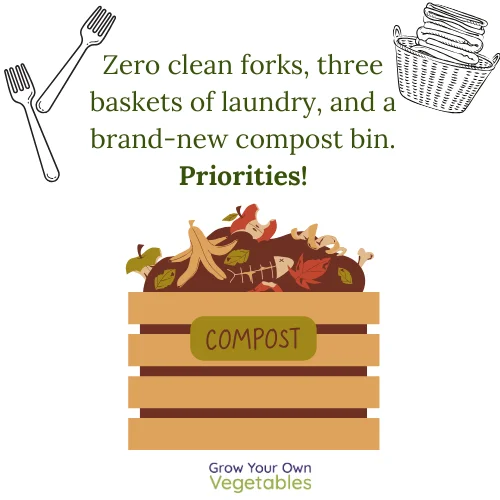Home Gardener’s
Weekly
Issue
No. 128
June
06, 2025
Successful Pest Management for the Organic Grower
5 Key Mindsets for an Organic Garden that THRIVES!
Tired of constantly battling pests in your garden? Successful Pest Management for the Organic Grower Guide reveals how to focus on management, not elimination, using simple prevention strategies, observations, and a partnership with nature.
Learn how to turn worry into a powerful tool and spend less time fighting pests, and more time nurturing a thriving garden.

Weekly Garden Tip
Want to harvest your amaranth grain easily? Amaranth seeds ripen about 90 days after planting, depending on your climate. You can tell the seeds are ready for harvest when they begin to fall from the flower head. If you give the flower head a light shake and see seeds falling, it’s time to harvest! Cut the flower head and hang dry the plants upside down in a cool dry area. Best to have a sheet or bucket underneath so that when you go to pull the seed head down, you’ll be able to shake the seeds right into the collection area and collect more seed.
There may not be a cure for Alzheimer’s yet, but exciting breakthroughs are offering real hope—and it starts with what’s on your plate.
In the Brain Breakthroughs Masterclass, you’ll discover four powerful superfoods scientifically shown to slash your risk of cognitive decline, protect against memory loss, and help maintain clear thinking well into your later years.
One of these delicious foods has been linked to 11 extra years of healthy brain function, and another—an everyday berry—may give you 2½ more years of cognitive health. (And yes, one of the top foods is a fan favorite you might already love!)
Inside the Masterclass, you’ll discover:
🧠 The four specific foods shown to reduce dementia risk
🫐 Which berry could add years of cognitive health—yum!
⏳ What people who live to be 100 eat to stay sharp and energized
🚫 Foods to stop eating right now to improve sleep, energy, memory, and focus
🔬 9 additional science-backed lifestyle habits that support long-term brain health
This is the real, research-based roadmap to keeping your mind strong—now and in the decades to come.
Learn over 40 different strategies to prevent pests, diseases, and weeds in your garden—everything you need to succeed!
🌱 Learn to identify diseases so you can effectively manage and prevent them.
🌱 Create and execute a plan tailored to YOUR garden and preferences.
🌱 Discover how to enrich your soil so you can significantly decrease diseases.
🌱 Identify beneficial insects so you know which ones to leave in your garden.
🌱 Create barriers to prevent animals from devouring your garden.

Take control of your garden so you can achieve bigger and healthier harvests from your garden for years to come.
This course is the best resource for you to protect your crops.
Get ahead of pests and diseases by learning:
🌱 Life cycles of pests and diseases
🌱 Best companion plants to repel pests
🌱 Proper techniques to water your plants to reduce diseases
🌱 Correct methods for safely disposing of diseased plant material
🌱 Pruning and harvesting techniques that stop pests and diseases
Gain Instant access to ALL LESSONS so you can start identifying what is happening in your garden TODAY!
Get the Pest & Disease Micro Course.
Your garden will thank you!
Buy Today for Just $97 $67.00 USD!
For your security, all orders are processed on a secured server.
Your purchase is protected by our 30-day money back guarantee.

Tired of losing your garden tools or struggling to keep your outdoor space organized? In 4 Types of Garden Hacks, we share how to stop misplacing tools, build your own handy gadget, adopt a mindset shift, and discover a fool-proof trick to never lose a tool again. These hacks are simple, smart, and super effective! 🌱🔧✨

What: 9th Annual Superfood Garden Summit
Who: Grow Your Own Vegetables
When: July 8 – 11, 2025
Get ready! The 9th Annual Superfood Garden Summit is almost here—and it’s packed with fresh inspiration to power up your garden and your health. This year’s summit features expert-led presentations on everything from The Healthiest Vegetables You Can Easily Grow to building a Garden for Better Digestion.
You’ll also learn how to create nutrient-rich soil, discover Unusual Super Fruits, explore permaculture principles, turn your garden into an income stream, blend up healing Herbal Green Smoothies, and so much more! Whether you’re a new gardener or a seasoned grower, this free online event will show you how to grow food that truly nourishes both body and soul.
Stay tuned—registration opens soon!

WHAT’S HAPPENING IN HARVEST CLUB
In last week’s LIVE Q&A we talked about preventing Japanese beetles, cover cropping under fruit trees, hanging plants for hummingbirds and more! To view the sneak peek, log into your portal and click here.
🍅🥕🌽🫐🍆🌱 Get your questions answered and keep moving forward on your fresh food goals in Harvest Club! 🍅🥕🌽🫐🍆🌱
Not a member of our garden membership Harvest Club? You can get a one-time complimentary two-month membership with any of our courses. Harvest Club has tons of resources to help you thrive. Plus, you get access to ongoing garden support through email. Learn more here.

Dear Arti:
Question: I have been working on preparing my soil for gardening and find that I have one weed that is very difficult to get rid of. I am thinking of actually taking out soil to see if it will help to get rid of GOAT WEED. Is this really the only way to have good soil? The thorns are horrible and the weed itself seems to be choking out what little grass I have. Any info on this would be so helpful. Thank you!!! – Kuulei G., UT
Answer: Hi Kuulei,
I believe you’re speaking of Epimedium, also referred to as bishop’s hat, horny goat weed, or yin yang huo. If that’s true, this plant originates in China and spreads rhizomatically, so it can be really challenging to get rid of. However, there are many main methods you can use to reduce the weed population, and you’ll ideally use them in tandem together.
First, pull up as many of the weeds as you can. This is best done when the soil is soft after a light rainfall. When you pull, remember that any node left in the ground can reproduce, so you may have to follow rhizomes down below the garden soil area into the hardpan below. And yes, in some instances, replacing the soil can be a good way to reduce the population to manageable levels.
Now, if the soil they’re growing in is not cultivated (i.e. they’re growing in the grass where the soil is hardpan), then pulling the weeds may be very challenging. In this case, cut the stem as far down as you can, then dip the tip in vinegar. Using a 45% industrial strength vinegar can improve your results. Be sure to wear proper protection if using this strength and avoid getting this on the ground where you want plants to grow. Keep dipping the stems. You may want to use an applicator like a turkey baster to help apply the vinegar to the stem tops.
Second, continue applying the vinegar until the hottest part of the summer arrives. Then, solarize the soil. This will impact the fertility of the soil, so you’ll want to replenish it later. Solarizing correctly will help kill off more of the rhizomes.
Once you solarize the soil, the population will have died back a bit. Stay on top of it! Pull any weeds you see immediately, and apply vinegar.
The first few years will take the most time, and in some rhizomatic weed cases, putting a weed barrier below and building the garden above ground may be the way to go.
I hope that helps, Kuulei! I know first hand how frustrating rhizome spreaders can be!

GYOV CEO and Lifestyle Gardener Denise Beins’s garden is shining with lavender, filling the air with its calming scent and standing out in stunning purple splendor. This hardy perennial not only adds beauty and fragrance to the space but also supports pollinators and offers a touch of herbal magic. Lavender is a reminder that even a simple bloom can bring peace, joy, and connection to nature.
What’s bringing you joy in your garden today?






![[TP] GBP Blog Post Images (1) Tiny bat held in hands](https://growyourownvegetables.org/wp-content/uploads/2022/06/TP-GBP-Blog-Post-Images-1.png)
